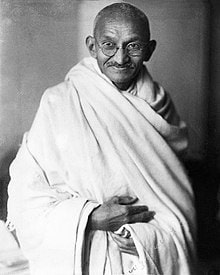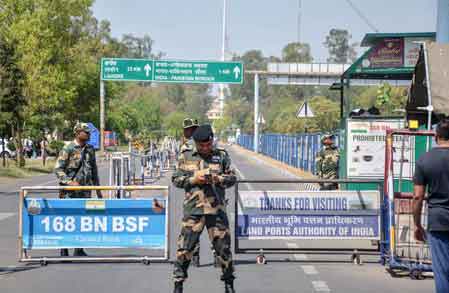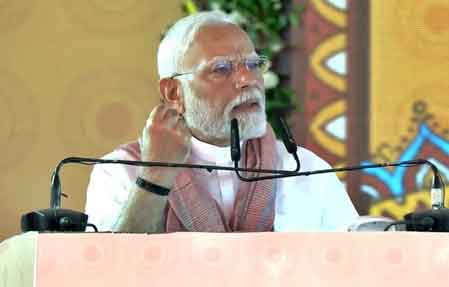As the nation celebrates the birth anniversary of Mahatma Gandhi, his legacy in Ahmedabad is far more than a historical memory -- it is a living, breathing force that continues to shape the city's ethos even today. Among the most potent symbols of this legacy is Navjivan Press, an institution representing Mahatma Gandhi's deep belief in the transformative power of words and the ethical responsibilities of journalism.
Located in the heart of Ahmedabad, this press served as a printing house and a vital organ of India's independence movement, where Mahatma Gandhi's ideas of non-violence, self-reliance, and moral integrity were translated into the printed word.
Navjivan Press, founded in 1919, played a crucial role during India's independence movement, not only as a printing house but as a centre for Gandhian thought.
Mahatma Gandhi, an astute printer and publisher, understood the significance of the press as a medium to spread his ideas of self-reliance, truth (Satyagraha), and non-violence (Ahimsa). It was through publications like Navjivan, Young India, and Harijan that Gandhi reached the masses, offering them not just news but a moral compass for navigating the colonial rule.
In a time when the British-controlled press often censored or disallowed critical content, Navjivan became a beacon of free speech and integrity. On September 7, 1919, Mahatma Gandhi purchased the Navjivan weekly from the Natwar Printing Press located near Khamasa Gate, Ahmedabad, after it became clear that no other press owner was willing to risk publishing his "radical anti-government ideas".
With 2,500 initial subscriptions, the Navjivan Weekly quickly became one of the most popular publications in Gujarat, amassing a readership of over 15,000, a record for any Gujarati weekly of that era. One of Navjivan Press' most significant publications is Hind Swaraj, a manifesto that laid out Mahatma Gandhi's vision for India's future.
In 1909, Mahatma Gandhi wrote Hind Swaraj in 10 days on board the SS Kildonan Castle during his voyage from London to Durban. The urgency with which he wrote the text is reflected in the fact that when his right hand grew tired, he switched to writing with his left hand. Initially written in Gujarati, Hind Swaraj critiqued modern civilisation and industrialisation, advocating for self-rule through non-violence.
For Mahatma Gandhi, publishing wasn't merely a business or a tool for propaganda -- it was an ethical responsibility. He famously said poor-quality printing was akin to violence because it deceived the reader. He insisted on high standards for typography, durable paper, and simple, functional book covers that would not add unnecessary costs.
Mahatma Gandhi wanted his books to be affordable to the common man. His autobiography, 'My Experiments with Truth', was initially priced at 12 annas, reflecting his desire to make important works accessible to all.
A Gujarat researcher recalls an anecdote encapsulating Mahatma Gandhi's uncompromising ethical stance. When the Navjivan Press once published a poor Gujarati translation of Gokhale's speeches, Mahatma Gandhi was asked to write the foreword. However, upon reviewing the translation, he declared it unworthy and demanded that the entire batch be destroyed. Even when told that the translation had cost Rs 700 -- a considerable sum at the time -- Mahatma Gandhi refused to back down, asking, "Do you think it desirable to place this rubbish before the public?"
Navjivan Press, like Mahatma Gandhi's entire philosophy, was not just about the immediate impact but about creating long-lasting, ethical systems. He used the press to propagate his ideas of self-reliance and truth, but it wasn't without challenges. The British authorities quickly noticed the influence of Mahatma Gandhi's writings on the Indian public. After he published a series of critical articles in Young India in 1922, the government retaliated by charging him with sedition.
On March 18, 1922, the streets of Ahmedabad buzzed as Mahatma Gandhi, accompanied by his confidants, walked to the courtroom. Despite the charges, the public respect for him was palpable -- everyone in the courtroom, including the judge, stood to greet him.
This trial did not stop Mahatma Gandhi from pursuing his mission. Although his press was confiscated and his files destroyed, he never wavered in his belief that the media should serve the public good. He famously remarked, "The press has a role to play. It has to become the people's Bible, Quran, and Gita rolled in one." He believed journalism should inspire courage, not fear, and that the truth could only be spoken when the press was free.
Today, Navjivan Press is more than just a printing house. It stands as a living monument to the values that Mahatma Gandhi cherished—truth, self-reliance, and non-violence.
With an annual turnover of Rs 1 crore, the press produces subsidised in-house publications, and its workforce of 135 people prints 20,000 copies daily. The press also generates revenue by copyrighting Mahatma Gandhi's collected works, including 'My Experiments with Truth', which has been translated into 24 foreign languages as well as Braille.






CM Dr Manik Saha emphasis on cleanliness of health centres; visits Gandhigram PHC
Chief Minister Dr Manik Saha on Thursday visited the Gandhigram Primary Health Centre and took a stock of the infrastructure and health care facilities in the Centre.
Only 66 percent households in Agartala connected with drinking water; CM Dr manic Saha instructs to expedite ongoing project work to cover more household
Chief Minister Dr Manik Saha on Thursday visited the Jal Board office here at Agartala and instructed the officials to expedite the ongoing project works for connecting more households with drinking water here in the capital town of Agartala.
India suspends visa services to Pakistani nationals with immediate effect
The Ministry of External Affairs (MEA) on Thursday announced that India has decided to suspend visa services to Pakistani nationals with immediate effect following the decisions taken by the Cabinet Committee on Security (CCS) in the wake of the Pahalgam terror attack.
Adani’s cement major ACC clocks highest-ever annual PAT at Rs 2,402 crore in FY25
Leading cement and building materials company ACC Limited on Thursday reported highest-ever annual profit after tax (PAT) at Rs 2,402 crore in FY25, up by 3 per cent.
'Celebrating bloodshed', social media fumes after man seen carrying cake to Pak High Commission
A video has emerged showing a man carrying a cake into the Pakistan High Commission in New Delhi on Thursday, just two days after the brutal terror attack that claimed the lives of 26 civilians in Jammu and Kashmir's Pahalgam and a day following India's strong diplomatic retaliation against Islamabad.
If villages are strong, India will develop faster: PM Modi on launching Rs 13,480-crore projects in Bihar
On the occasion of National Panchayati Raj Day, Prime Minister Narendra Modi addressed a massive public gathering in the Madhubani district of Bihar and inaugurated a series of development projects across key sectors, including railways, infrastructure, LPG, and rural empowerment -- collectively worth over Rs 13,480 crore.
Pahalgam attack: BJP legislators in Bengal stage protest, burn Pakistan flags in front of Assembly
BJP legislators in Bengal, led by the Leader of the Opposition in West Bengal Assembly Suvendu Adhikari, on Thursday staged protests against the Pahalgam terror attack by burning Pakistan flags in front of the House.
J&K Police announce Rs 20 lakh reward for information on Pahalgam attack terrorists
The J&K Police on Thursday announced a reward of Rs 20 lakh for anyone providing information that leads to the arrest of Pakistani nationals and local Lashkar-e-Taiba terrorists involved in the Pahalgam terror attack.